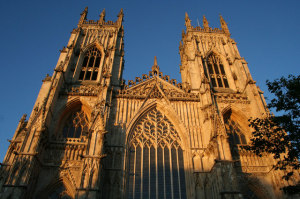THIS ARTICLE WAS FIRST WRITTEN FOR AND PUBLISHED BY BREAKPOINT.
For the past two weeks, my church in Orlando has been, like many churches around the world, hard at work responding to the coronavirus crisis:
How will we care for those effected by the virus? How will we continue our worshiping life, carry on leadership meetings, and handle a possible loss of financial support?
One of the tools helping us answer these questions has been technology. In fact, technology has been one of the only tools available to us in a time when local officials have asked us to stay home. So, we began livestreaming our liturgies and communicating daily with our congregation through emails and social media platforms. This has given all of us comfort and a needed (albeit disembodied and virtual) sense of connectedness during the uncertainty of this pandemic.
But I have to make a confession. A quiet unease has been lurking in my soul with every virtual worship service I participate in. It’s a dissonance between the reality of the global pandemic and my (subconscious?) attempts, via technology, to keep my life as “normal” as possible, in the realms where such false normalcy is possible: my emotions, my relationships, and my spiritual life.
“The six feet of physical distance between me and the person in line at the grocery store, not to mention the empty streets and closed businesses in my city, confronts me with this reality.”
Let me explain.
Physically speaking, the truth of the tragedy facing our world is unavoidable: the entire globe has ceased to function. The six feet of physical distance between me and the person in line at the grocery store, not to mention the empty streets and closed businesses in my city, confronts me with this reality.
But, if I so choose, with technology, I can leave this bleak physical existence and, thanks to emotion-numbing Netflix series, small group Facetime hang outs, and live-streamed worship, live relatively the same life I had before this whole thing started. Pandemic who?
Let me be clear. Technology isn’t the enemy. I’m no Luddite. I’ve read recent articles addressing these issues that sound, to my pastoral ears, unsafe on the one hand, or grumpy on the other. I’d prefer to avoid both postures, if possible. I believe technology is great until it becomes, like any gift of God, one more creative way we avoid the frailty of our humanity and the hunger of our souls; that is, our need for God.
But our use of technology the past few weeks has come dangerously close to the story of Job whose friends repeatedly offered him cheap answers to the question of the overwhelming tragedy that had beset his life. Such answers were no doubt attractive options for Job in ending the tension he lived between a God who claimed to be good and the unspeakable tragedy that God allowed. (In the end, even God Himself refused to give Job explanations for the evil he had endured, opting instead to remind Job of the trustworthiness of His own authoritative identity as God, the maker of heaven, earth, and every mystery in between.)
Aren’t Christians people who tell the truth, as best we can, according to God’s word, about ourselves, our world, and about God? To lose this calling is to lose ourselves and our mission, right? This was the kind of prophetic calling that Flannery O’Connor embraced. She awakened readers to their universal need for God’s grace by refusing to shield them from the violence and grotesque brokenness of a world in need of a savior. In the face of Covid-19, I believe this is now our calling, too.
What if this pandemic is offering us as Christians an opportunity to show the world not how to avoid human pain, but how to process it with honesty, endurance, sacrifice, Christ-like compassion, and most importantly, the hope of eternal life offered in Jesus Christ?
Normally, in these articles, my thoughts would end here. If you’ve had your fill, stop now! If, on the other hand, you want one (admittedly technology-addicted person’s) practical suggestion for moving into the days ahead, read on. It’s actually just one word.
“Grieve because, “Jesus wept.” This verse of Scripture, infamous for its brevity, is a profound statement about dealing with tragedy honestly as the beloved people of God.”
Grieve.
Grieve because the overwhelming presence of laments in the book of Psalms, more than any other genre, are instructive for us in all times of life, but especially during a global human crisis. Psalm 4, for instance, is a Psalm of Lament prayed in the liturgy of Compline right before sleep.
Grieve because, “Jesus wept.” This verse of Scripture, infamous for its brevity, is a profound statement about dealing with tragedy honestly as the beloved people of God. Be sure to read the context of the verse- that wonderfully moving story of Jesus raising Lazarus from the dead. Incidentally (providentially) this was the gospel story assigned to be read in many churches all around the world this past Sunday, March 29th!
Finally, grieve because sadness is what healthy humans do with tragedy in a fallen world. Grieving evil will actually move you toward sanity, toward healthy relationships, and toward intimacy with God.
I’ll leave you with these encouraging words from author, Mike Mason, in his work, Practicing the Presence of People, about the nature of grief:
Sadness signals change…It is an intermediate emotion, a feeling that is going somewhere. Like a seventh or a ninth chord in music, it is rich in subtle tones that tend toward resolution, lean toward home. This is what distinguishes sadness from moroseness, self-pity, or depression, all of which have a feeling of stuckness. Sadness is always in motion in the backfield. You will know the real thing by this sense of movement toward happiness. In photographs, crying and laughing are hard to tell apart.
Sadness is like that moment in a rainstorm when the rain has not yet stopped, but there is a perceptible brightening, and there comes that subtle change in the atmosphere signifying the imminence of a rainbow. Sadness is hopeful. Anger feels hard in the body, fear feels alien, and depression is like a dull poison. But sadness is at home in flesh and blood. It is a soft and relaxed presence, a comfortable garment for the heart.






